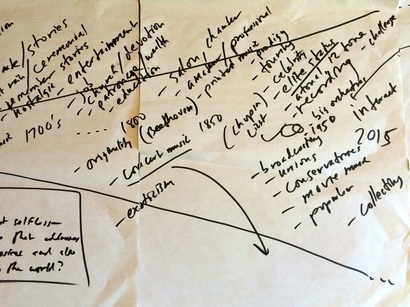|
Here are some of the personal expectations for this course, shared with me during the first sessions in Boston and Providence:
1. To learn the steps to creating a nonprofit organization. 2. To find my own unique perspective. 3. To be open, learn a lot, grow. 4. To gain concrete skill-building and nonprofit know how. 5. To experience a consistent framework, through-line. 6. To be supported to follow through. 7. To consolidate my learning and dabbling. 8. To gain courage and confidence. 9. To be able to focus on formulating and organizing one project. 10. To build a team with like-minded people 11. To make a dream lead to providing income 12. To learn from other's experiences I see it as three intersecting areas of interest across the twenty participants: 1. To build skills related to nonprofit organizations 2. To learn, to grow 3. To feel supported to imagine, design, and importantly, follow through on an idea I believe that this new course exists at the nexus of those three expectations. Looking forward to finding out!
0 Comments
Regarding the role(s) and relevance of professional musicians in society... where are we with this in 2015? During our first meeting in Providence, we collaboratively constructed a (highly subjective and likely terribly inaccurate) historical timeline of Classical Musicians, from the Stone Age (approximately) to the current day. My thought was that zooming all the way out would give us enough perspective to help us see the evolution more clearly.
While the landscape has become incredibly rich and diverse, the same basic things that humans needed from music and musicians back in the Stone Age (or thereabouts) are surely still valuable today. In Providence, we brainstormed the following: celebration, ceremony, entertainment, storytelling, remembering, group cohesion... With the exception of entertainment (and hopefully making meaning and finding emotional fulfillment) for a decidedly niche audience, which of these important--even essential--community functions do professional musicians regularly fulfill in 2015? I should note here that I'm referring specifically to Classically-trained musicians. What happened in our history that allowed professional musicians to become so divorced from the expectation of being responsive to the needs of their neighbors? There's never been a time with greater access to becoming a professional musician. Yet that increased opportunity to pursue a life as an artist doesn't correlate with an increase in relevance and value to society at large. In fact, given the trend lines for racial and ethnic demographics in the US, one can speculate that this disconnect with professional Classical musicians will only increase. Given this cultural context, how do we go about encouraging individual artistic passions while also figuring out how to meet a real need, serve an important purpose, become relevant (again)? A new professional chapter begins for me this week. This year, while continuing in my role directing NEC's Sistema Fellowship Resource Center, I also have the exciting opportunity to pilot several courses through NEC’s School of Continuing Education, starting with this one about designing community-based residencies that are both artistically rewarding and financially sustainable.
This new course--offered both at NEC and in Providence--is built on curriculum that was specifically created for the Sistema Fellows Program, an intensive one-year immersion at the intersection of music education, nonprofits, leadership, and social change. Over five years, that curriculum was improved upon and refined, responding to feedback from faculty and the Fellows themselves. I was hired as Program Director in time to work with the 4th and 5th classes of Fellows. But this course is also built on the many one-on-one conversations that I have had with professional musicians over the past fifteen years, especially during my time at Community MusicWorks. What if we tried this? How come it didn't work? Why not do it this way instead? If only there was a way to bundle up all of the questioning, dreaming, and strategizing into something that could be delivered efficiently, made widely accessible, and become repeatable... My hope is that this course is--or soon will become--a vehicle that will allow musicians of all stripes to think passionately and proactively about shaping careers of their choosing within a community context. I couldn't be more excited to get underway with this next chapter! Heath Marlow |
AboutSharing student project documentation and, more recently, my own. Archives
June 2022
Categories |

 RSS Feed
RSS Feed
